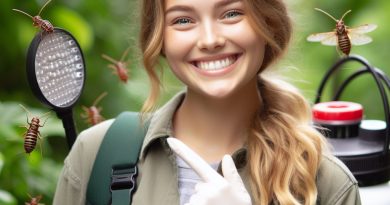Safe & Effective Natural Pesticides
Last Updated on February 5, 2024
Introduction
Pesticides play a crucial role in ensuring the safety and productivity of agriculture.
Agricultural pests can cause significant yield losses and quality deterioration in crops.
However, the use of synthetic pesticides has raised concerns due to their negative impacts.
These synthetic pesticides can harm human health, contaminate the environment, and lead to the development of pesticide-resistant pests.
As a result, there has been a growing interest in safe and effective natural pesticides.
Natural pesticides are derived from natural sources like plants, minerals, and microorganisms.
These pesticides offer a viable alternative to synthetic chemicals while minimizing the environmental and health risks.
Safe and effective natural pesticides are biodegradable, target-specific, and have minimal toxicity to non-target organisms.
Moreover, they can be integrated into pest management programs to promote sustainable agriculture.
Benefits of natural pesticides include reduced chemical residues in crops, improved soil health, and protection of beneficial insects.
In addition, some natural pesticides have shown repellent or deterrent properties against pests.
Overall, the use of safe and effective natural pesticides presents a promising solution for sustainable pest control in agriculture.
It ensures the protection of crops, minimizes environmental hazards, and supports long-term ecological balance.
What are natural pesticides?
Definition and characteristics of natural pesticides
Natural pesticides are a form of pest control derived from organic sources such as plants, bacteria, and animals.
These pesticides, unlike synthetic alternatives, are safe and effective in protecting crops and gardens from pests without harming humans, animals, or the environment.
Firstly, let’s define natural pesticides.
They are substances that occur naturally in the environment and are used to kill or repel pests that can harm plants or crops.
These pesticides are an alternative to synthetic chemicals and are derived from organic sources.
One of the characteristics of natural pesticides is their biodegradability.
Unlike synthetic pesticides, which can persist in the environment for years, natural pesticides break down quickly and do not accumulate in soil or water.
Another characteristic is their low toxicity to humans and animals.
Natural pesticides are generally safe to use and pose minimal risks to human health and the environment.
They are also less likely to cause resistance in pests, making them a valuable tool for integrated pest management.
Examples of natural pesticides derived from plants, bacteria, and animals
Examples of natural pesticides derived from plants include neem oil, pyrethrum, and rotenone.
Neem oil, extracted from the seeds of the neem tree, is effective in combating a wide range of pests, including aphids, spider mites, and whiteflies.
Pyrethrum, derived from the dried flowers of certain chrysanthemum species, is a powerful insecticide that targets insects such as mosquitoes, flies, and cockroaches.
Rotenone, obtained from the roots of various tropical plants, acts as a broad-spectrum insecticide and is commonly used in organic farming.
Bacteria can also be a source of natural pesticides.
Bacillus thuringiensis (Bt), for example, is a soil-dwelling bacterium that produces proteins toxic to many types of insects.
Bt-based pesticides are widely used in agriculture to control pests like caterpillars, leaf miners, and mosquitoes.
Animals, too, can provide natural pesticides.
Ladybugs and lacewings, for example, are beneficial insects that feed on aphids and other garden pests.
By attracting and preserving these helpful insects, farmers and gardeners can effectively control pest populations without the use of synthetic chemicals.
Benefits of using natural pesticides over synthetic alternatives
Using natural pesticides over their synthetic alternatives offers several benefits.
Firstly, natural pesticides are safer for farmers, consumers, and the environment.
Synthetic pesticides often have harmful side effects and can contaminate soil, water, and air, posing a threat to ecosystems and human health.
Natural pesticides also support biodiversity.
By using organic and natural pest control methods, farmers and gardeners can maintain a healthy balance of beneficial insects and pests, thus promoting a diverse and resilient ecosystem.
Moreover, using natural pesticides helps to reduce pesticide residues in food.
Many synthetic pesticides leave residues on crops, which can be harmful if ingested.
By choosing natural alternatives, consumers can minimize their exposure to potentially harmful chemicals.
Additionally, natural pesticides are an important tool in sustainable agriculture.
They can be used as part of integrated pest management strategies, reducing reliance on synthetic chemicals and promoting environmentally friendly farming practices.
Essentially, natural pesticides are a safe and effective alternative to synthetic chemicals for pest control.
Derived from organic sources such as plants, bacteria, and animals, these pesticides offer numerous benefits, including biodegradability, low toxicity, and support for biodiversity.
By choosing natural pesticides, we can protect our crops and gardens without compromising our health or the environment.
Read: Aquaponics: Fish Types & Plant Choices
Safety considerations of natural pesticides
Natural pesticides are gaining popularity among consumers due to their safe and effective nature.
These pesticides offer numerous benefits, including reduced toxicity and environmental impact, minimizing risks to human health and wildlife.
In addition, regulations and certifications provide further assurance of their safety.
Safety considerations are of paramount importance when using any kind of pesticide, including natural ones.
While natural pesticides are generally safer than synthetic alternatives, it is still crucial to handle them with care.
Always read and follow the instructions provided by manufacturers to ensure proper usage.
Reduced toxicity and environmental impact
One of the major advantages of natural pesticides is their reduced toxicity and minimal environmental impact.
They are typically derived from organic substances, such as plants or bacteria, making them biodegradable and less harmful to the ecosystem.
This allows for targeted pest control without causing harm to beneficial insects, wildlife, or the surrounding environment.
Minimizing risks to human health and wildlife
Another primary concern when using pesticides is the potential risks they pose to human health and wildlife.
Natural pesticides have a lower risk of toxicity compared to synthetic counterparts, making them a preferred choice for those who value their well-being and the preservation of biodiversity.
However, it is still important to use protective gear when handling any pesticide, such as gloves, masks, and goggles, to minimize any potential risks.
Regulations and certifications for natural pesticides
To ensure the safety and efficacy of natural pesticides, regulatory and certification bodies play a crucial role.
These organizations set guidelines and standards for the manufacturing and use of natural pesticides.
Certifications
Through rigorous testing and evaluation, they determine the safety and efficacy of these products, granting certifications that provide consumers with peace of mind.
Certifications such as the Organic Materials Review Institute (OMRI) and the Environmental Protection Agency’s (EPA) “USDA Organic” label indicate that a natural pesticide has met strict criteria for safety and environmental impact.
When purchasing natural pesticides, look for these certifications to ensure that you are using a product that has been thoroughly tested and approved.
Production, labeling, and use of natural pesticides
In addition to certifications, regulations are in place to govern the production, labeling, and use of natural pesticides.
These regulations vary from country to country, ensuring that these products are safe for consumers and do not harm the environment.
It is important to be aware of and comply with these regulations to ensure the proper and responsible use of natural pesticides.
In general, the safety considerations of natural pesticides are of utmost importance.
They offer reduced toxicity and environmental impact, minimizing risks to human health and wildlife.
The presence of regulations and certifications ensures that these pesticides are thoroughly tested and meet strict criteria.
By using natural pesticides responsibly and following guidelines, we can protect our health and the environment while effectively managing pests.
Read: Compact Composting: Tips for Tiny Areas
Effectiveness of Natural Pesticides
Natural pesticides have gained significant popularity in recent years due to the growing concerns over the adverse effects of conventional chemical-based pesticides.
These natural alternatives are not only safe but also prove to be highly effective in controlling various types of pests.
Efficacy against Different Types of Pests
Natural pesticides showcase exceptional efficacy against a wide range of pests, including insects, fungi, and weeds.
They offer a holistic approach to pest management without causing harm to beneficial organisms.
- Insect Control: Natural pesticides such as neem oil, garlic spray, and pyrethrum effectively combat an array of insect pests, including aphids, caterpillars, mites, and whiteflies.
- Fungal Protection: Copper-based fungicides and essential oils like cinnamon and clove oil are highly effective against various fungal diseases that affect crops and plants.
- Weed Management: Organic herbicides like vinegar, salt, and corn gluten meal provide successful control over unwanted weeds, reducing competition for nutrients and space.
Integrated Pest Management (IPM) Practices with Natural Pesticides
Integrated Pest Management (IPM) is a vital practice that combines various pest control strategies, and natural pesticides play a significant role in this approach.
- Prevention and Monitoring: IPM emphasizes prevention and the early detection of pest problems. Natural pesticides can be used proactively to prevent infestations or monitor pests’ presence.
- Cultural Practices: Natural pesticides are often incorporated into IPM strategies that include crop rotation, intercropping, and companion planting to enhance the plant’s natural defense against pests.
- Biological Control: By sparing beneficial insects and organisms, natural pesticides promote biological control of pests. This maintains a balance in the ecosystem and minimizes the need for chemical interventions.
Research Studies Supporting the Effectiveness of Natural Pesticides
Extensive research studies have been conducted to validate the effectiveness of natural pesticides, shedding light on their immense potential.
1. A study published in the Journal of Economic Entomology found that neem oil and garlic-based insecticides displayed remarkable efficacy against pests like aphids, thrips, and beetles.
2. Another research on the use of essential oils as natural fungicides, published in Phytopathology, showed successful control of various plant diseases caused by fungi.
3. The International Journal of Pest Management published a study confirming the effective weed control using vinegar-based herbicides, suggesting their potential to replace chemical options.
In conclusion, the effectiveness of natural pesticides in pest management is well-established. These eco-friendly alternatives provide a sustainable solution without compromising the health of the environment and human well-being.
Read: Pint-Size Farms: Growing Food on Terraces
Common natural pesticides and their uses
Natural pesticides are an effective and safe way to control pests in your garden.
They offer a natural solution without harming the environment or exposing yourself to harmful chemicals.
In this section, we will discuss some common natural pesticides and their uses.
Neem oil
Neem oil is a versatile natural pesticide that can be used to control a wide range of pests.
It works by disrupting the insect’s hormonal balance, making it difficult for them to grow, feed, or reproduce.
Neem oil is effective against aphids, mites, caterpillars, and other common garden pests.
Diatomaceous earth
Diatomaceous earth is a physical barrier against pests.
It is made up of the fossilized remains of tiny aquatic organisms called diatoms.
When insects come into contact with diatomaceous earth, it damages their exoskeleton, causing dehydration and death.
Diatomaceous earth is effective against crawling insects such as ants, cockroaches, and fleas.
Bacillus thuringiensis (Bt)
Bt is a natural pesticide that specifically targets certain insect pests.
It contains bacteria that produce toxins harmful to many insects, but not to humans, birds, or other animals.
Bt is commonly used to control caterpillars, beetles, and mosquito larvae.
Garlic-based pesticides
Garlic-based pesticides repel pests through their strong odor.
They are easy to make by blending garlic cloves with water and straining the mixture into a spray bottle.
Garlic-based pesticides are effective against aphids, Japanese beetles, and spider mites.
Soap-based pesticides
Soap-based pesticides suffocate pests with soap solutions.
They disrupt the pest’s cell membranes, causing them to dehydrate and die.
Soap-based pesticides can be made by mixing mild liquid soap with water and spraying it directly on the pests.
They are effective against aphids, mealybugs, and whiteflies.
Tips for using natural pesticides
Using natural pesticides can help maintain a balanced ecosystem in your garden while effectively controlling pests.
Here are some tips for using natural pesticides:
- Always follow the instructions on the product label.
- Test the pesticide on a small area before applying it to the entire plant.
- Apply pesticides during calm weather conditions to minimize drift.
- Apply pesticides early in the morning or late in the evening when beneficial insects are less active.
- Rotate different types of natural pesticides to prevent pests from developing resistance.
In essence, natural pesticides are a safe and effective alternative to chemical pesticides.
Neem oil, diatomaceous earth, Bacillus thuringiensis (Bt), garlic-based pesticides, and soap-based pesticides are all common options for natural pest control.
By utilizing these natural remedies, you can protect your garden from pests without harming the environment.
Read: Patio Farming 101: Easy Container Crops

Application and Usage Tips
- Always read and follow the instructions provided by the manufacturer for proper application.
- Wear protective clothing, including gloves and goggles, to avoid direct contact with the pesticide.
- Apply pesticides when the weather conditions are favorable, preferably on a calm day with no rain forecasted.
- Do not apply pesticides near water sources to prevent contamination of aquatic habitats.
- Use caution when applying pesticides near flowering plants to avoid harming beneficial insects like bees.
- Apply pesticides directly to the affected areas or target pests for optimal effectiveness.
- Reapply the pesticide as necessary, following the recommended intervals mentioned in the instructions.
- Regularly inspect treated areas to monitor the effectiveness of the pesticide and spot any resurgence of pests.
Proper Handling and Storage of Natural Pesticides
- Store natural pesticides in their original containers with clearly labeled instructions to prevent confusion.
- Keep pesticides out of reach of children and pets in a locked cabinet or storage area.
- Store pesticides in a cool, dry place away from direct sunlight to maintain their effectiveness.
- Check the expiration date of the pesticide and dispose of any outdated products properly.
- Avoid transferring pesticides into food containers, as this may lead to accidental consumption.
- Follow local regulations for the proper disposal of empty pesticide containers to minimize environmental impact.
- Do not store different pesticides together to avoid potential chemical reactions or cross-contamination.
- In case of spills or accidents, clean up and dispose of the contaminated materials according to the manufacturer’s guidelines.
Correct Dilution and Application Methods
- Use the recommended dilution ratio specified on the pesticide label to ensure proper concentration.
- Properly measure both the pesticide and water when diluting to maintain accuracy.
- Mix the pesticide and water thoroughly using a suitable container or sprayer before application.
- Apply pesticides evenly, covering the target area fully, to achieve uniform coverage and effective control.
- Use appropriate application equipment such as sprayers, dusters, or brushes as directed by the manufacturer.
- Avoid excessive application, as it may lead to chemical runoff and non-target effects.
- Clean and maintain application equipment regularly to prevent cross-contamination between different areas.
Timing and Frequency of Pesticide Application
- Apply pesticides when pests are actively present or during their vulnerable life stages.
- Consider the life cycle of the pests to determine the most effective timing for pesticide application.
- Apply pesticides earlier in the day to allow for better adherence and drying time before evening dew.
- Avoid applying pesticides in extreme temperatures, as it may reduce their effectiveness.
- Follow the recommended frequency of application mentioned in the instructions to achieve long-term control.
Complementary Practices to Enhance Effectiveness
- Maintain good sanitation practices to eliminate pest-friendly environments and reduce reliance on pesticides.
- Use mechanical methods like handpicking or trapping to control pests before resorting to pesticide application.
- Employ biological control methods, such as introducing beneficial insects, to naturally regulate pest populations.
- Rotate between different types of natural pesticides to prevent the development of pest resistance.
- Enhance soil health through proper organic amendments and cultivation practices to promote plant vigor and pest resistance.
- Encourage biodiversity by planting diverse crops and creating habitat for natural enemies of pests.
- Educate yourself about integrated pest management (IPM) strategies to minimize pesticide use and maximize effectiveness.
By following these application and usage tips, handling and storage guidelines, correct dilution and application methods, appropriate timing and frequency, and complementary practices, you can achieve safe and effective control of pests using natural pesticides.
A Word of Caution: Potential Limitations of Natural Pesticides
Natural pesticides have gained popularity due to their perceived safety and effectiveness in controlling pests.
However, it is crucial to understand their limitations and potential drawbacks before solely relying on them.
Here are some important points to consider:
Variability in Potency and Persistence
- Natural pesticides may not have consistent efficacy against different types of pests.
- Their potency can vary depending on factors like formulation, application method, and environmental conditions.
- Some natural pesticides break down quickly, which means they may need frequent reapplication.
- Others can persist in the environment for an extended period, raising potential concerns.
Resistance Development in Pests
- Pests can develop resistance to natural pesticides, just like they do with synthetic ones.
- As pests evolve and adapt, their tolerance to natural compounds can increase.
- Continuous and exclusive use of a specific natural pesticide may promote resistance in target pests.
- Rotation or combination of different natural pesticides is important to minimize resistance development.
Integrated Approach for Pest Management
- Natural pesticides should be part of an integrated pest management (IPM) approach.
- IPM combines various strategies like biological control, cultural practices, and monitoring.
- Identifying pest thresholds and employing non-chemical methods whenever possible is crucial.
- Natural pesticides should be used as a supplementary tool in conjunction with other control measures.
Addressing these limitations
In order to address these limitations, it is essential to follow best practices and consider the following suggestions:
- Conduct thorough research: Understand the target pests, their biology, and susceptibility to various natural pesticides.
- Choose appropriate products: Select natural pesticides that are specifically designed for the pests you want to control.
- Follow label instructions: Adhere to the recommended dosage, application frequency, and safety precautions mentioned on the product label.
- Monitor effectiveness: Regularly assess the success of natural pesticides in controlling the target pests.
- Rotate pesticides: Employ different natural pesticides with distinct modes of action to prevent resistance development.
- Seek professional advice: Consult with local agricultural extension services or pest control experts for tailored recommendations.
- Raise awareness: Educate others about the benefits and limitations of natural pesticides, promoting responsible and informed usage.
In a nutshell, while natural pesticides offer safer alternatives to synthetic chemicals, they are not without limitations.
Variability in potency and persistence, as well as the development of resistance in pests, must be considered.
Adopting an integrated approach to pest management is crucial to maximize effectiveness and minimize potential drawbacks.
Using natural pesticides as part of a comprehensive strategy can lead to sustainable and successful pest control.
Conclusion
The importance of adopting safe and effective natural pesticides cannot be overstated.
By using these alternatives, farmers can protect their crops without harm to the environment or human health.
Furthermore, exploring natural alternatives encourages sustainable farming practices and reduces the dependence on chemical pesticides.
In the future, advancements in natural pest control methods hold great promise.
New technologies and research are being developed to enhance the efficacy and safety of natural pesticides.
As awareness grows, more farmers are likely to adopt these methods, leading to a healthier and more sustainable agricultural industry.
It is crucial for farmers to embrace these natural alternatives and contribute to the preservation of our environment and well-being.
Together, we can create a greener and safer future for generations to come.


